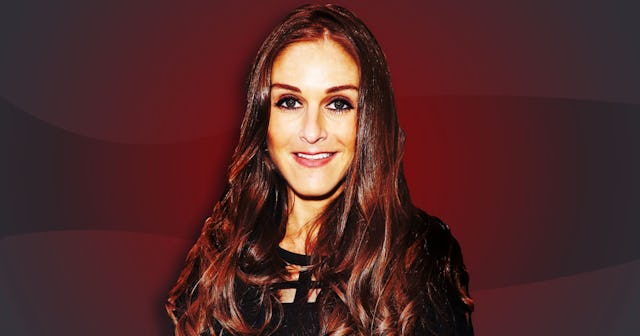Nikki Grahame's Death Is a Painful Reminder Of How Serious Eating Disorders Can Be

Trigger warning: eating disorders, descriptions of disordered eating
Early Friday morning, loved ones (and fans) of Nikki Grahame received some terribly tragic news: The reality TV star, best known for her appearance on the seventh season of “Big Brother,” had died. She was 38 years old. “It is with immeasurable sadness that Nikki Grahame passed away in the early hours of Friday 9th April 2021,” a statement from her representative read. “Please respect the privacy of Nikki’s friends and family,” he added. “[Particularly] at this tragic and difficult time.”
No cause of death was given, though Grahame recently received treatment for an eating disorder and it’s believed her passing may be tied to complications from anorexia. The reality star had struggled with the condition for more than 30 years and even wrote two books on the subject, “Dying to Be Thin” in 2009 and “Fragile,” published in 2012. According to Grahame’s mother, Susan, her daughter started refusing food at the age of seven but lockdown had “floored” Nikki, worsening her condition.
“We’ve been on this road a long time — 30 years on and off,” Susan told The Telegraph in March. “I’ve never seen her this bad,” she added. “I’m frightened that I’ll die and she’ll have no one to support her. I don’t want her to go through any of this alone.” And I understand Susan’s perspective. As an eating disorder survivor, I can tell you — with absolute certainty — living with this illness is very lonely. It is scary and isolating and, in many ways, feels hopeless. But my first thought upon hearing of Grahame’s passing was selfish and self-serving. I could have been her, I thought. That could and should have been me. What did I do differently? Why did I survive?
You see, I began restricting food early. Very early. The first time I snubbed my nose at a meal I was 12 or 13. I passed on a plate of pasta. I lied and said I’d already eaten. I wasn’t hungry. The second time was less memorable. I was avoiding meals altogether or swapping out a full meal for something small, like a side salad. And I did this for years. I consumed low-calorie yogurt for breakfast — when I ate breakfast. Most days, my mornings were full of hot coffee and several cups of ice cold water. For lunch, I would eat a broth-based soup. Something clear and light. Each can contained 150 calories or less. And for dinner I ate TV dinners. Smart Ones. Lean Cuisine. Healthy Choice. I wanted to eat as little as possible.
But eventually, these “smart” and “healthy” options weren’t enough. My weight wasn’t going down fast enough, and my hips were still too wide. My thighs were thick and my waist still wasn’t small so I turned to packs of pureed baby food. Stage 3 meals like oats and peaches, pasta and red sauce, turkey and rice, and macerated lasagna. I worked out continuously and obsessively. I remember listening to Alanis Morissette and No Doubt while doing crunches. I worked my abs until I couldn’t breathe and felt like I was going to throw up. And while I was able to lose some more weight, I maintained more than anything.
I was a legal adult weighing 86 pounds, and I was actively trying to become even smaller.
And while the compliments poured in — my friends were jealous I could fit into size 1 jeans — I wasn’t healthy. I lost my menstrual cycle and gained digestive issues. Reflux became a prominent problem in my life. It is an issue I still struggle with to this day. I would get dizzy and lightheaded. I frequently lost my balance, tripping on sidewalks, off curbs, and into oncoming traffic in my busy city. Emotionally, I was a disaster. I was anxious and depressed and terribly lonely. As previously mentioned, eating disorders are isolating diseases. I avoided social situations (and, well, any situation) which involved food. I never went to the mall or movies or even out to dinner. And I was cold. All the time. My lips and fingertips were always blue. The skin on my hands and the soles of my feet cracked. It’s been 16 years since I “recovered” and they still bleed.
“Eating disorders affect people of every age, race, size, gender identity, sexual orientation and background,” an article on the National Association of Anorexia Nervosa and Associated Disorders explains. “Eating disorders are among the deadliest mental illnesses, second only to opioid overdose. 10,200 deaths each year are the direct result of an eating disorder — that’s one death every 52 minutes,” deaths like Grahame’s.
And while this moment is hardly about me — while Grahame’s death is not about my experience, battle, or story — her journey is one many of us in the eating disorder community can relate to. The consequences of eating disorders are far-reaching and long-lasting. And it’s important we talk about the severity of anorexia, bulimia, and other eating disorders. It’s important we increase access to both care and support. Early intervention is, in many cases, key. We need greater awareness around the subject of eating disorders and a better understanding of how they work. And it’s imperative we stop celebrating and glorifying individuals based on their size, and shrinking bodies. Think about the message this sends without getting defensive about your present/past behaviors. Because skinny isn’t necessarily healthy. Just like being fat doesn’t make you unwell.
Grahame’s life mattered, and anorexia stole her away. We need to do better for Grahame, and others, who are suffering.
If you or someone you know is struggling with disordered eating habits and/or have an eating disorder, know this: There is help and hope. For more information about eating disorder recovery, call the National Eating Disorders Association at 1-800-931-2237.